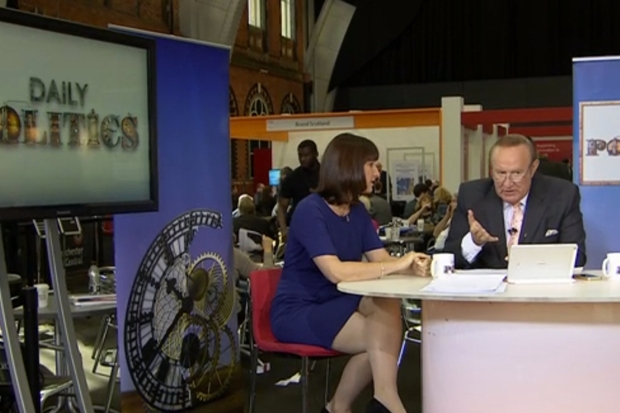Rachel Reeves’ interview on BBC Daily Politics may have been excruciating at times (below), but was it really the ‘car crash’ that the Tories are today claiming? Matthew Hancock is crowing that she pointed out the conditions necessary for reducing debt. She said:-
‘We are planning to get the national debt down, which means you have to be running a surplus to be able to do that. If you are going to have national debt falling you have to have a surplus overall… To get debt falling you have to have a surplus on overall spending.’
Whether wittingly or not, Reeves went further than Ed Balls. She said she wants a “surplus overall,” as distant from the surplus on the chunk of the budget defined as ‘current spending’. This is the same as the Tory policy. A delighted Hancock shot out a response saying:-
‘Rachel Reeves has let the cat out of the bag. She has backed the Conservatives’ plan to deal with our debts, not Labour’s. She admits that the only way to get “debt falling” is to “have a surplus on overall spending”. As the Institute for Fiscal Studies say, Ed Balls’ policy means £28.3 billion more borrowing per year in the next parliament. Labour haven’t learned their lesson. They would burden our children with more debt than our children could ever hope to repay.’
I’m afraid that it’s Hancock, not Reeves, who is being economical with the actualite. The IFS has made no such claim – it has merely pointed out that Balls’ fiscal target is looser than that of the Conservatives. Ed Balls would balance the ‘current’ budget, rather than the capital one which leaves him more wiggle room.
But when it comes to promises on debt, the Tories don’t have much to shout about. Hancock used the approved verbal formula: the ‘Conservatives’ plan to deal with our debts’. Let’s see what he means:

This is ‘dealing with the debt’ in the same way that the late George Best dealt with the drink. Notice the careful language: ‘deal with the debt’ is intended to give voters the impression that the Tories are cutting the debt – rather than keep on borrowing-and-spending like drunken Keynesians. Polls show that only a minority of the public realise that the national debt is rising – so the Tory strategy to conceal this fact is succeeding.
So how much difference is there between the two parties on debt? Quite a lot, verbally. George Osborne spent his time in opposition lambasting Labour’s plans to increase debt. The spirit was willing, but the flesh… well the below graph tells the story.

If Osborne had kept his promise about debt (he promised to have the debt/GDP ratio falling by now) then he’d be in a position to poke fun at Labour. But instead he chose to jack up the national debt by 48 per cent, while his ministers use language intended to disguise this fact from voters (mainly by talking about ‘deficits’, a Westminster wonk word used nowhere outside SW1). The horrible truth is that, on debt, there is depressingly little to choose between the two parties.







Comments